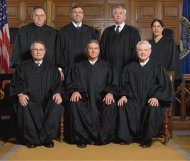Nebraska Supreme Court: No DUI in a Private Driveway
Jeffrey McCave was sentenced in a county court to thirty days in jail, two years of probation and a $1000 fine for listening to music in an undriven car parked on his father’s driveway while drunk. The Nebraska Supreme Court on Friday used the case to clarify that the charge of driving under the influence of alcohol (DUI) does not apply in a personal driveway.
When McCave did not listen to his father, John McCave, who told him to go away, the police were called. Officers arriving at the scene noticed McCave was drunk in a car and asked him to take a breath test. McCave refused, saying he had not driven anything. Officers proceeded to pile on charges.
“I guess I just inferred with the beer being in the car that him and the beer got there by the vehicle,” Officer Benjamin Faz testified.
McCave was hit with DUI, refusing a breath test, possessing an open container of alcohol in a vehicle, trespassing and resisting arrest. The officers did not bother asking Susan McCave whether she had been the one to invite her stepson to the house that night.
Prosecutors argued that the DUI charge applies to a residential driveway because McCave had physical control of the vehicle and that he might have been about to leave. They also insisted McCave’s car was on public property because it partially overhung a sidewalk. The high court explained that DUI statues do not apply to a person on private property not open to public access. Past precedent in the state held that an apartment complex parking lot qualified as being open to public access, but the case at hand was different.
“As a matter of law, we conclude that a residential driveway is not private property that is open to public access,” Justice William Connolly wrote for the court. “Members of the general public have no right or implied permission to use a private residential driveway. Nor do they have the ‘ability to enter’ the driveway in the same sense that a member of the public might drive through or use a private parking lot by custom.”
The court blasted the prosecutor’s argument that McCave’s car was subject to the DUI statute because it was parked at least in part on public property.
“Nor do we think that the driveway’s characterization as private property without public access changed just because McCave’s vehicle overhung the sidewalk,” Connolly wrote. “We do not believe the legislature intended to make a citizen drinking a beer while cleaning out his vehicle parked in his driveway guilty of a crime because the vehicle is overhanging the sidewalk.”
The court also discarded the prosecution’s insistence that McCave was guilty of DUI simply because the police officer claimed the man had stated he was “leaving.”
“Obviously, if McCave had committed an offense in front of the officers, they would have had grounds for an arrest,” Connolly wrote. “But his statement that he was leaving, even if his hand was on the key in the ignition, showed only that he had considered driving but changed his mind.”
The high court went on to blast the sloppy police work that led to McCave’s conviction.
“No witness reported that McCave was driving a vehicle at any time, and the officers did not pose this critical question to McCave or any witness,” Connolly wrote. “Before officers invoke the power of a warrantless arrest, the Fourth Amendment requires them to investigate the basic evidence for the suspected offense and reasonably question witnesses readily available at the scene, at least when exigent circumstances do not exist. This is particularly true when the circumstances the officers encounter are consistent with lawful conduct. As previously discussed, it is not unlawful for a person to be intoxicated in a vehicle on private property not open to public access.”
The court reversed all of McCave’s convictions, although it did allow retrial on the trespass charge. A copy of the ruling is available in a 650k PDF file at the source link below.
Source:
Nebraska v. McCave (Nebraska Supreme Court, 10/14/2011)
[Courtesy: Thenewspaper.com]
More by The Newspaper
Latest Car Reviews
Read moreLatest Product Reviews
Read moreRecent Comments
- Kjhkjlhkjhkljh kljhjkhjklhkjh haaaaaaaaaaahahahahahahahaha
- Kjhkjlhkjhkljh kljhjkhjklhkjh *Why would anyone buy this* when the 2025 RamCharger is right around the corner, *faster* with vastly *better mpg* and stupid amounts of torque using a proven engine layout and motivation drive in use since 1920.
- Kjhkjlhkjhkljh kljhjkhjklhkjh I hate this soooooooo much. but the 2025 RAMCHARGER is the CORRECT bridge for people to go electric. I hate dodge (thanks for making me buy 2 replacement 46RH's) .. but the ramcharger's electric drive layout is *vastly* superior to a full electric car in dense populous areas where charging is difficult and where moron luddite science hating trumpers sabotage charges or block them.If Toyota had a tundra in the same config i'd plop 75k cash down today and burn my pos chevy in the dealer parking lot
- Kjhkjlhkjhkljh kljhjkhjklhkjh I own my house 100% paid for at age 52. the answer is still NO.-28k (realistically) would take 8 years to offset my gas truck even with its constant repair bills (thanks chevy)-Still takes too long to charge UNTIL solidsate batteries are a thing and 80% in 15 minutes becomes a reality (for ME anyways, i get others are willing to wait)For the rest of the market, especially people in dense cityscape, apartments dens rentals it just isnt feasible yet IMO.
- ToolGuy I do like the fuel economy of a 6-cylinder engine. 😉


































Comments
Join the conversation
The cops should have waited for him to leave the driveway!
Sometimes I feel like my belief in our legal system is restored but I know reality is around the next corner.